#Deploying a Node.js App on Heroku
Explore tagged Tumblr posts
Text
Deploying a Node.js App on Heroku
A Step-by-Step Guide Heroku has long been one of the favorite platforms for developers when it comes to deploying, managing, and scaling apps. Known for its simplicity, Heroku is especially friendly towards beginners, making it an excellent choice for deploying your first Node.js application. In this article, we’ll walk you through the process step-by-step. What is Heroku? Heroku is a cloud…
View On WordPress
#deploy with heroku#Deploying a Node.js App on Heroku#heoku#heroic deployment#heroku#javascript#node#node.js#spinnekop#Step-by-Step#Web Development
0 notes
Note
hi hi! love your blog! I am also working on building sites for my portfolio but am a little stumped on how/where to deploy them. would you mind sharing what you are using for deployment? thanks!
Places to Deploy Your Website

Hiya! I know a few places I've tried in the past and some I am yet to try but I know other developers use them!

GitHub pages
GitHub Pages is a free static site hosting service that allows you to publish your website directly from a GitHub repository. It supports HTML, CSS, and JavaScript, as well as Jekyll, a static site generator. I used GitHub pages a lot since I use GitHub to keep all my repositories.
Replit
Replit is a cloud-based development environment that provides an integrated IDE, code editor, and hosting platform all in one place. With Replit, you can easily create and deploy web apps, games, and other projects in multiple programming languages such as Python, HTML, CSS, and JavaScript. I use Replit a lot too for my other much smaller projects that I can’t upload on GitHub to run the program online!
Netlify
Netlify offers a free plan for static site hosting that includes features such as continuous deployment, custom domains, and SSL encryption. It supports HTML, CSS, and JavaScript, as well as serverless functions and other backend technologies.
Heroku
Heroku offers a free plan for hobbyist developers that allows you to deploy up to 5 applications. It supports many languages and frameworks, including Ruby, Node.js, Python, Java, PHP, and Go. Heroku allows free hosting for small applications.
Firebase Hosting
Firebase Hosting is a free service that allows you to host and deploy your web app or static content to a global content delivery network (CDN) with SSL encryption. It supports HTML, CSS, JavaScript, and other static assets. It allows free hosting for small applications.
Surge
Surge is a free static site hosting service that allows you to publish your website with a custom domain or a Surge subdomain. It supports HTML, CSS, JavaScript, and other static assets. Allows free hosting with unlimited bandwidth.

Each of these free deployment options has its own cons such as:
Its lack of server-side functionality
Limited database support
The cost of advanced features
Limited control over the infrastructure
May not be suitable for more complex websites or applications
However, for small projects, I think you’ll be fine with the free options!
Hoped this helps and good luck with your websites’ deployments! 🥰🙌🏾💗

#my asks#codeblr#coding#progblr#programming#studying#studyblr#developer#developers#comp sci#computer science#cs student#cs studyblr#resources#coding resources#deployment#deploy websites#portfolio#deployment websites#tech#web dev
213 notes
·
View notes
Text
You can learn NodeJS easily, Here's all you need:
1.Introduction to Node.js
• JavaScript Runtime for Server-Side Development
• Non-Blocking I/0
2.Setting Up Node.js
• Installing Node.js and NPM
• Package.json Configuration
• Node Version Manager (NVM)
3.Node.js Modules
• CommonJS Modules (require, module.exports)
• ES6 Modules (import, export)
• Built-in Modules (e.g., fs, http, events)
4.Core Concepts
• Event Loop
• Callbacks and Asynchronous Programming
• Streams and Buffers
5.Core Modules
• fs (File Svstem)
• http and https (HTTP Modules)
• events (Event Emitter)
• util (Utilities)
• os (Operating System)
• path (Path Module)
6.NPM (Node Package Manager)
• Installing Packages
• Creating and Managing package.json
• Semantic Versioning
• NPM Scripts
7.Asynchronous Programming in Node.js
• Callbacks
• Promises
• Async/Await
• Error-First Callbacks
8.Express.js Framework
• Routing
• Middleware
• Templating Engines (Pug, EJS)
• RESTful APIs
• Error Handling Middleware
9.Working with Databases
• Connecting to Databases (MongoDB, MySQL)
• Mongoose (for MongoDB)
• Sequelize (for MySQL)
• Database Migrations and Seeders
10.Authentication and Authorization
• JSON Web Tokens (JWT)
• Passport.js Middleware
• OAuth and OAuth2
11.Security
• Helmet.js (Security Middleware)
• Input Validation and Sanitization
• Secure Headers
• Cross-Origin Resource Sharing (CORS)
12.Testing and Debugging
• Unit Testing (Mocha, Chai)
• Debugging Tools (Node Inspector)
• Load Testing (Artillery, Apache Bench)
13.API Documentation
• Swagger
• API Blueprint
• Postman Documentation
14.Real-Time Applications
• WebSockets (Socket.io)
• Server-Sent Events (SSE)
• WebRTC for Video Calls
15.Performance Optimization
• Caching Strategies (in-memory, Redis)
• Load Balancing (Nginx, HAProxy)
• Profiling and Optimization Tools (Node Clinic, New Relic)
16.Deployment and Hosting
• Deploying Node.js Apps (PM2, Forever)
• Hosting Platforms (AWS, Heroku, DigitalOcean)
• Continuous Integration and Deployment-(Jenkins, Travis CI)
17.RESTful API Design
• Best Practices
• API Versioning
• HATEOAS (Hypermedia as the Engine-of Application State)
18.Middleware and Custom Modules
• Creating Custom Middleware
• Organizing Code into Modules
• Publish and Use Private NPM Packages
19.Logging
• Winston Logger
• Morgan Middleware
• Log Rotation Strategies
20.Streaming and Buffers
• Readable and Writable Streams
• Buffers
• Transform Streams
21.Error Handling and Monitoring
• Sentry and Error Tracking
• Health Checks and Monitoring Endpoints
22.Microservices Architecture
• Principles of Microservices
• Communication Patterns (REST, gRPC)
• Service Discovery and Load Balancing in Microservices
1 note
·
View note
Text
How to Deploy Your Full Stack Application: A Beginner’s Guide
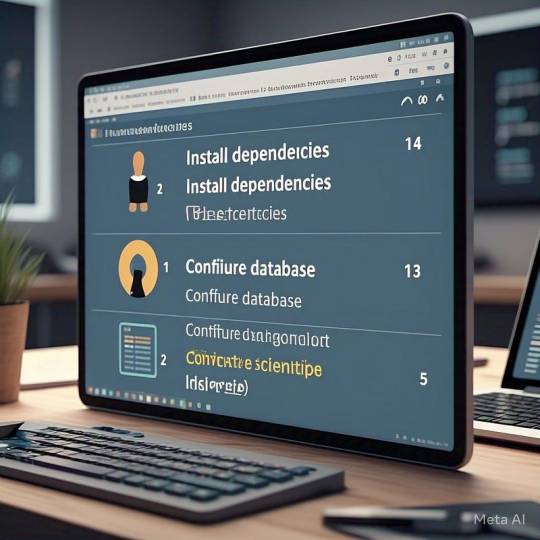
Deploying a full stack application involves setting up your frontend, backend, and database on a live server so users can access it over the internet. This guide covers deployment strategies, hosting services, and best practices.
1. Choosing a Deployment Platform
Popular options include:
Cloud Platforms: AWS, Google Cloud, Azure
PaaS Providers: Heroku, Vercel, Netlify
Containerized Deployment: Docker, Kubernetes
Traditional Hosting: VPS (DigitalOcean, Linode)
2. Deploying the Backend
Option 1: Deploy with a Cloud Server (e.g., AWS EC2, DigitalOcean)
Set Up a Virtual Machine (VM)
bash
ssh user@your-server-ip
Install Dependencies
Node.js (sudo apt install nodejs npm)
Python (sudo apt install python3-pip)
Database (MySQL, PostgreSQL, MongoDB)
Run the Server
bash
nohup node server.js & # For Node.js apps gunicorn app:app --daemon # For Python Flask/Django apps
Option 2: Serverless Deployment (AWS Lambda, Firebase Functions)
Pros: No server maintenance, auto-scaling
Cons: Limited control over infrastructure
3. Deploying the Frontend
Option 1: Static Site Hosting (Vercel, Netlify, GitHub Pages)
Push Code to GitHub
Connect GitHub Repo to Netlify/Vercel
Set Build Command (e.g., npm run build)
Deploy and Get Live URL
Option 2: Deploy with Nginx on a Cloud Server
Install Nginx
bash
sudo apt install nginx
Configure Nginx for React/Vue/Angular
nginx
server { listen 80; root /var/www/html; index index.html; location / { try_files $uri /index.html; } }
Restart Nginx
bash
sudo systemctl restart nginx
4. Connecting Frontend and Backend
Use CORS middleware to allow cross-origin requests
Set up reverse proxy with Nginx
Secure API with authentication tokens (JWT, OAuth)
5. Database Setup
Cloud Databases: AWS RDS, Firebase, MongoDB Atlas
Self-Hosted Databases: PostgreSQL, MySQL on a VPS
bash# Example: Run PostgreSQL on DigitalOcean sudo apt install postgresql sudo systemctl start postgresql
6. Security & Optimization
✅ SSL Certificate: Secure site with HTTPS (Let’s Encrypt) ✅ Load Balancing: Use AWS ALB, Nginx reverse proxy ✅ Scaling: Auto-scale with Kubernetes or cloud functions ✅ Logging & Monitoring: Use Datadog, New Relic, AWS CloudWatch
7. CI/CD for Automated Deployment
GitHub Actions: Automate builds and deployment
Jenkins/GitLab CI/CD: Custom pipelines for complex deployments
Docker & Kubernetes: Containerized deployment for scalability
Final Thoughts
Deploying a full stack app requires setting up hosting, configuring the backend, deploying the frontend, and securing the application.
Cloud platforms like AWS, Heroku, and Vercel simplify the process, while advanced setups use Kubernetes and Docker for scalability.
WEBSITE: https://www.ficusoft.in/full-stack-developer-course-in-chennai/
0 notes
Text
How to Build Web Apps? A Step-by-Step Guide

In today’s digital-first world, web application development has become a vital skill for businesses, startups, and individual developers alike. Whether you’re building a web app for personal use, as a business tool, or to create a product for the public, knowing how to approach the development process is essential. From the initial planning phase to deployment, building a web app involves a series of steps that, when executed properly, result in an intuitive and functional online application.
In this step-by-step guide, we’ll walk you through the process of creating your own web app, from understanding the basics of web app development to the final launch. If you're new to web development or looking to enhance your knowledge, this guide will provide a solid foundation.
Step 1: Define the Purpose and Scope of Your Web App
Before jumping into the development process, it’s crucial to define the purpose and scope of your web application. Ask yourself: What problem will this web app solve? Who is the target audience? Is the goal to provide a service, sell products, or offer a platform for users to engage with? The answers to these questions will shape the overall architecture of your app.
Additionally, you should define the features your web app will include. Start with the core functionalities and consider future expansions. Sketch out your app’s user flow and design wireframes, as these early visuals will help communicate your app’s structure to developers and designers.
Step 2: Choose the Right Tech Stack
Choosing the right technology stack is one of the most critical decisions you'll make during web application development. The tech stack defines the tools, languages, and frameworks that will power your app. Here are some key components to consider:
Frontend Development: This is the part of the app users will interact with. HTML, CSS, and JavaScript are essential for creating the user interface (UI). Frameworks like React, Angular, or Vue.js can be used to build dynamic and responsive web pages.
Backend Development: This part handles the business logic, databases, and server-side functions. Popular backend technologies include Node.js, Ruby on Rails, Django, and Flask.
Database: Choose a database that matches your app’s needs. Relational databases like MySQL or PostgreSQL are common for data-heavy applications, while NoSQL options like MongoDB are used for more flexible data structures.
Hosting & Deployment: Platforms like AWS, Heroku, and DigitalOcean are popular for deploying web applications.
Your tech stack decision will be influenced by factors such as the complexity of the app, expected traffic, and available resources.
Step 3: Design the User Interface (UI)
The user interface (UI) is the face of your web app. It should be intuitive, user-friendly, and responsive. When designing your UI, consider your target audience’s preferences and needs. Tools like Figma, Adobe XD, and Sketch are excellent for designing prototypes and wireframes.
Focus on creating clean, minimalistic layouts that allow users to navigate easily. Make sure the app is mobile-friendly, as many users access web apps from their phones or tablets. Responsive design ensures that your app adapts to different screen sizes, improving the overall user experience.
Step 4: Develop the Web Application
Once your design is in place and your tech stack is chosen, it’s time to start coding. Divide the development process into manageable stages:
Frontend Development: Using HTML, CSS, and JavaScript (along with any chosen frontend framework), you’ll implement the design and make the app interactive. This includes creating forms, buttons, and other UI elements.
Backend Development: Write the server-side logic that powers your app. This could involve user authentication, payment processing, data handling, and more. You’ll also connect your app to the database and ensure secure data storage.
APIs & Integrations: Many web apps need to interact with external services (such as payment gateways, social media platforms, or email services). This is where APIs (Application Programming Interfaces) come in. You’ll need to integrate third-party APIs for features like payments, user authentication, or notifications.
Step 5: Test the Web App
Testing is crucial in web app development to ensure your app functions as expected and is free from bugs. Perform different types of testing:
Unit Testing: Testing individual components of your app for functionality.
Integration Testing: Ensuring that the components work together as a whole.
User Acceptance Testing (UAT): Testing the app from a user’s perspective to ensure it meets their needs.
Automated testing tools like Jest, Mocha, and Selenium can help streamline this process.
Step 6: Launch and Monitor Your Web App
After rigorous testing, it’s time to deploy your web app to a live server. Choose a reliable hosting provider, and make sure your web app is scalable and secure. Once launched, monitor performance to ensure everything is running smoothly.
Use analytics tools like Google Analytics, Hotjar, or Mixpanel to track user behavior, identify any potential issues, and gather data to improve future iterations of your app. If you're interested in exploring the benefits of web application services for your business, we encourage you to book an appointment with our team of experts.
Book an Appointment
Step 7: Maintain and Update Your Web App
Web app development doesn’t end after launch. Regular updates and maintenance are necessary to keep the app secure, functional, and aligned with user needs. Ensure that you’re fixing bugs, updating libraries, and adding new features based on user feedback.
For businesses, understanding the mobile app cost calculator can be helpful when deciding whether to expand your web app into a mobile app. By estimating the cost of developing a mobile version of your web app, you can better allocate resources and plan your next steps.
Web App Examples: What Can You Build?
If you're still unsure about the kinds of web apps you can create, here are some web app examples that might inspire you:
E-commerce Platforms: Build an online store with features like product catalogs, shopping carts, and payment processing.
Social Media Apps: Create a platform where users can interact, share content, and engage with each other.
Project Management Tools: Develop an app to help teams collaborate, track tasks, and manage deadlines.
Content Management Systems (CMS): Build a platform that allows users to create, manage, and publish digital content.
By starting small and gradually expanding your web app, you can create something truly unique and valuable for your users.
Conclusion
Building a web app is a multi-step process that requires careful planning, development, and ongoing maintenance. By following this guide, you can navigate the complexities of web application development and create a successful, user-friendly product. If you're looking to develop a robust, scalable web app, consider reaching out to experts who can help guide you through the process and ensure your project’s success.
0 notes
Text
Becoming a Full-Stack MERN Developer: A Comprehensive Guide
In today's tech-driven world, full-stack development is one of the most sought-after skills. Companies of all sizes are looking for developers who can handle both the front-end and back-end, delivering seamless applications. One of the most popular technology stacks for full-stack developers is the MERN stack: MongoDB, Express.js, React, and Node.js.
In this blog, we will dive deep into the path of becoming a Full-Stack MERN Developer and why it's a great choice for budding developers in 2024.
What is the MERN Stack?
MERN is a collection of four powerful technologies:
MongoDB: A NoSQL database where the data is stored in a JSON-like format, making it flexible and ideal for applications with varying data types.
Express.js: A web application framework for Node.js, which simplifies building server-side logic and APIs.
React: A popular JavaScript library for building user interfaces, primarily for single-page applications (SPAs). It's fast, dynamic, and makes building interactive UIs a breeze.
Node.js: A JavaScript runtime that allows you to run JavaScript on the server side. It's non-blocking and event-driven, making it highly scalable for web applications.
Why Learn MERN in 2024?
All JavaScript: MERN allows developers to use JavaScript from front to back, creating a seamless development experience. Learning one language to work on both the server and client-side reduces complexity.
Growing Demand: The demand for full-stack developers is growing, with MERN being one of the most popular stacks in startups and established companies. Developers with MERN skills are highly sought after.
Versatility: With MERN, you can build a wide variety of applications, from single-page web apps to complex enterprise-level applications.
Open-Source: All the components of MERN are open-source, meaning there's a large community to help troubleshoot and contribute to the ecosystem.
Key Skills You Need as a Full-Stack MERN Developer
Proficiency in JavaScript: JavaScript is at the core of MERN development. Understanding both ES6+ features and how JavaScript interacts in both the browser and server environments is crucial.
Front-End Mastery (React): Learning React allows you to create fast and interactive user interfaces. You'll need to master concepts like component lifecycle, state management, hooks, and React Router for navigation.
Server-Side Development (Node.js & Express.js): For back-end logic, you'll be working with Node.js and Express.js to create APIs, handle routes, manage middleware, and connect to the database.
Database Management (MongoDB): Understanding MongoDB’s document-based structure, handling queries, and integrating it with Node.js is a must.
Version Control (Git): Full-stack developers need to know version control to collaborate with teams and manage code repositories effectively.
API Design (RESTful & GraphQL): Designing and consuming APIs is a fundamental skill. You'll also need to know about RESTful services and, increasingly, GraphQL for more efficient querying.
Building Your First MERN Application
Setup: First, you need to set up your environment. Install Node.js, MongoDB, and create a React app with create-react-app. You can also use services like MongoDB Atlas to host your database in the cloud.
Server-Side Development: Use Express.js to create your server. Set up your routes, manage middleware for handling requests, and create APIs for data exchange between the front and back end.
Front-End Development: Build your UI using React. Break your application into components, manage state efficiently with useState and useEffect, and ensure smooth navigation with React Router.
Database Integration: Connect your Express server to MongoDB to store and retrieve data. Use Mongoose to create schemas and interact with the database.
Deploying Your Application: Finally, deploy your MERN application using services like Heroku for the server-side and Netlify for the client-side. Make sure your app is fully functional, and optimize it for performance.
Resources to Get Started
Here are some fantastic resources to kickstart your journey as a MERN developer:
MongoDB Documentation: MongoDB Docs
Express.js Official Guide: Express.js Docs
React Official Documentation: React Docs
Node.js Documentation: Node.js Docs
Full-Stack Open Course: A free course for mastering full-stack development. Full Stack Open
Conclusion
Becoming a Full-Stack MERN Developer in 2024 can open up numerous opportunities. The MERN stack offers flexibility, scalability, and speed, making it perfect for building modern web applications. Whether you're just starting or looking to enhance your skills, now is the time to dive into MERN development and become a valuable asset in the tech industry.
At sudo24, we’re committed to empowering developers to build their dream projects. Start learning MERN today and take your development skills to the next level!
This post will give your readers a thorough understanding of what it takes to become a Full-Stack MERN Developer, encouraging them to embark on this exciting journey!
1 note
·
View note
Text
Full Stack Development Courses with React in Vashi: A Pathway to Modern Web Development
In the fast-evolving world of web development, mastering full stack development has become an essential skill set for tech professionals. Full stack developers are highly sought after as they possess the ability to work on both the front-end and back-end aspects of a web application. Among the numerous frameworks available, React, a popular front-end JavaScript library developed by Facebook, stands out for its efficiency, flexibility, and ease of use. In Vashi, an emerging tech hub in Navi Mumbai, several institutes offer specialized courses in Full Stack Development courses with React vashi, making it an excellent location for aspiring developers to enhance their skills.
Understanding Full Stack Development with React
Full stack development refers to the practice of building both the client-side (front-end) and server-side (back-end) components of a web application. A full stack developer is proficient in several programming languages, tools, and frameworks that cover these two areas. While the back-end typically involves working with databases, server-side scripting, and APIs, the front-end focuses on creating interactive user interfaces.
React is a modern JavaScript library specifically designed to build fast and dynamic user interfaces. It simplifies the process of creating reusable UI components, making it easier for developers to manage large-scale applications. Combined with back-end technologies like Node.js, Express.js, and databases like MongoDB or SQL, full stack development with React provides the capability to create robust, end-to-end web solutions.
Key Components of a Full Stack Development Course in Vashi
Courses in full stack development with React offered in Vashi generally cover a wide range of topics designed to give learners a comprehensive understanding of both front-end and back-end development. Here’s a breakdown of what you can expect:
HTML, CSS, and JavaScript: These are the foundational technologies for front-end development. Courses typically start with in-depth lessons on HTML (HyperText Markup Language) for structuring web pages, CSS (Cascading Style Sheets) for styling, and JavaScript for adding interactivity.
React: React is introduced as the primary framework for building user interfaces. Topics covered include React components, JSX (JavaScript XML), state management, lifecycle methods, and hooks. You’ll learn how to create dynamic and responsive web applications using React’s component-based architecture.
Node.js and Express.js: On the back-end, you’ll be taught how to use Node.js, a runtime environment for executing JavaScript code server-side. Express.js, a web application framework for Node.js, is used to handle routing, middleware, and HTTP requests. This allows you to build APIs that communicate with the front-end React application.
Database Management: Full stack development requires proficiency in databases, both relational (like MySQL) and non-relational (like MongoDB). Most courses will include lessons on how to interact with databases, perform CRUD operations (Create, Read, Update, Delete), and manage data in the context of a web application.
Version Control and Deployment: You’ll also learn how to use Git for version control and collaborate with other developers. Additionally, courses often cover deploying web applications to cloud platforms such as Heroku or AWS, making your app accessible on the internet.
Project-Based Learning: A key aspect of these courses is hands-on project work. Building real-world applications not only reinforces the concepts learned but also helps students create a portfolio of projects, which is crucial when applying for jobs in the tech industry.
Benefits of Learning Full Stack Development in Vashi
Local Industry Demand: Vashi, part of the Navi Mumbai area, is home to several IT companies and start-ups that are looking for skilled full stack developers. Enrolling in a course locally can help you build a professional network and increase your chances of landing a job.
Expert Trainers and Mentorship: Many institutes in Vashi offer personalized mentorship from industry experts, giving you the opportunity to receive guidance and feedback on your projects.
Cost-Effective Education: Compared to larger cities, courses in Vashi tend to be more affordable, making them an attractive option for learners looking to gain valuable skills without breaking the bank.
Enrolling in a Full Stack Development with React and Angular nerul can open up numerous career opportunities in the tech industry. With comprehensive training in both front-end and back-end development, students will be well-prepared to take on roles in web development, software engineering, or even as freelance developers. The combination of local demand, quality education, and hands-on learning makes Vashi an ideal location for aspiring full stack developers to start their journey into modern web development.
0 notes
Text
Road Map To Build Your Ecommerce App
Here's a roadmap to build your eCommerce app:
1. Planning & Research
Identify the Target Audience: Define your ideal customer personas.
Market Research: Analyze competitors and market trends.
Feature List: List essential features like user registration, product catalog, cart, payment gateway, order tracking, etc.
Tech Stack: Choose the appropriate tech stack (e.g., Flutter or React Native for mobile, Node.js or Django for backend).
2. Design Phase
Wireframes: Sketch the layout and flow of the app.
UI/UX Design: Design an intuitive and responsive user interface for mobile and web platforms.
Branding: Choose color schemes, fonts, and logo that reflect your brand.
3. Backend Development
Database Setup: Choose a database (e.g., MySQL, MongoDB) to store user and product information.
APIs Development: Develop RESTful APIs for handling data, authentication, and transactions.
Security & Authentication: Implement user authentication, data encryption, and payment security.
4. Frontend Development
Mobile & Web Development: Develop the front end of the app using chosen frameworks (React, Flutter, or native languages).
Responsive Design: Ensure that the app works smoothly on different devices.
Cart & Checkout Flow: Build a seamless shopping experience from browsing to checkout.
5. Payment Gateway Integration
Payment Providers: Integrate with payment providers like PayPal, Stripe, or Razorpay.
Multicurrency Support: If necessary, add support for multiple currencies.
Order Processing: Ensure accurate order processing, confirmation, and notifications.
6. Testing
Unit & Integration Tests: Test the individual components and their interaction.
Usability Testing: Conduct beta testing with real users to gather feedback.
Security Testing: Ensure that user data and transactions are secure.
Performance Testing: Test the app under high traffic loads.
7. Deployment
Cloud Hosting: Choose a cloud provider (e.g., AWS, Azure) to host your backend.
App Store Submission: Submit your mobile app to Apple App Store and Google Play Store.
Web Hosting: Deploy the web version on a reliable hosting provider (e.g., Netlify, Heroku).
8. Post-Launch
Monitor & Optimize: Continuously monitor app performance and optimize for speed and usability.
Updates & New Features: Release updates based on user feedback and evolving trends.
Marketing & SEO: Implement digital marketing strategies and optimize the app for search engines.
9. Maintenance
Bug Fixes: Regularly fix bugs and improve the app.
Scaling: Add new features and scale the app as the user base grows.
Customer Support: Set up a support system for users.
This roadmap provides a structured path to building a successful eCommerce app, ensuring a balance between functionality, usability, and scalability.
Read More: Ecommerce Mobile App Development Cost
0 notes
Text
Why SyntaxLevelUp Offers the Best Full Stack Developer Course in Pune
Pune has rapidly become a hub for IT training and education, making it an ideal place for aspiring software developers to kick-start their careers. With the growing demand for full stack developers, enrolling in a full stack development course can provide a competitive edge. Among the numerous institutes offering such courses, SyntaxLevelUp stands out for its comprehensive and placement-driven approach. Let's dive into why a full stack developer course in Pune, especially with SyntaxLevelUp, can be your best career move.
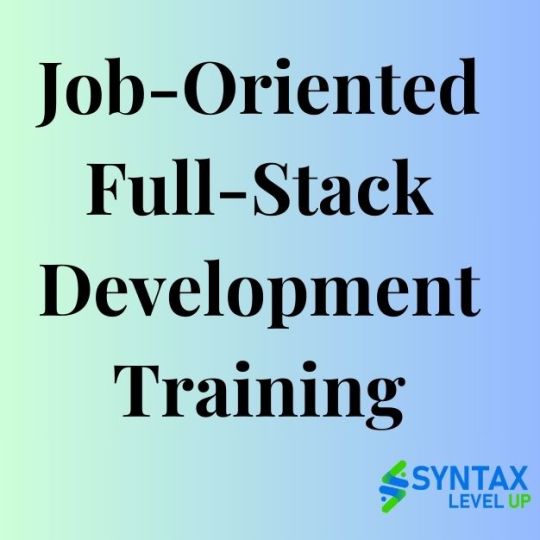
Why Choose Full Stack Development?
A full stack developer is a professional capable of working on both front-end and back-end development, making them highly versatile in the tech world. As businesses increasingly seek professionals with a broad skill set, full stack developers are in high demand. By mastering both client-side and server-side technologies, full stack developers play a pivotal role in web and software development.
What Does a Full Stack Developer Course in Pune Offer?
Enrolling in a full stack development course in Pune will equip you with the skills needed to build complete web and mobile applications. These courses generally cover:
Front-End Development: Learn to design responsive and dynamic user interfaces using HTML, CSS, and JavaScript.
Back-End Development: Master server-side programming with languages like Java, Python, or Node.js, along with databases like MySQL, MongoDB, and more.
Version Control: Get hands-on experience with tools like Git for collaboration and project management.
API Integration: Understand how to work with RESTful APIs to integrate various services within web applications.
Deployment: Learn to deploy and manage applications on platforms like AWS, Heroku, or Google Cloud.
What Sets SyntaxLevelUp Apart?
Among the many training providers in Pune, SyntaxLevelUp has built a reputation for offering top-notch full stack developer courses with a focus on job placement. Here are some reasons why SyntaxLevelUp should be on your radar:
Comprehensive CurriculumSyntaxLevelUp’s full stack web development course covers everything from basic coding to advanced frameworks. Whether you’re a beginner or someone with some coding experience, the course is designed to elevate your skills. Topics include full stack Java, MERN (MongoDB, Express.js, React.js, Node.js), and more.
Placement AssistanceSyntaxLevelUp provides 100% placement support, making it one of the best full stack courses in Pune for those aiming for job-ready skills. Their dedicated placement team ensures you get opportunities in top tech companies, both local and international.
Hands-on LearningThe course emphasizes practical learning through real-world projects. SyntaxLevelUp ensures that you not only learn concepts but also apply them by building end-to-end projects that showcase your skills to potential employers.
Industry Expert TrainersWith industry-experienced trainers, you’ll learn best practices that are up-to-date with the latest tech trends. They provide mentorship throughout the learning journey, ensuring you grasp both theoretical concepts and practical applications.
Flexible Learning OptionsWhether you prefer weekday, weekend, or fast-track batches, SyntaxLevelUp offers flexible learning schedules to suit your lifestyle. This flexibility ensures that professionals and students alike can benefit from the course without compromising other commitments.
The Path to Becoming a Full Stack Developer
Taking a full stack developer course in Pune opens up several career paths, including web developer, software engineer, mobile app developer, and even tech lead roles. With comprehensive courses that cover both front-end and back-end development, you’ll be well-prepared to land high-paying jobs in top tech companies.
Conclusion: Why Full Stack Development is a Great Career Choice in Pune
Pune’s growing IT sector presents an excellent opportunity for those looking to break into tech or level up their careers. By choosing a full stack developer course with SyntaxLevelUp, you’ll gain the technical knowledge, practical experience, and industry connections needed to thrive in the software development field.
With high placement rates, an extensive curriculum, and a hands-on approach to learning, SyntaxLevelUp is one of the best full stack developer classes in Pune. Whether you're looking to specialize in Java full stack development or learn the MERN stack, this course can set you on the path to success.
#fullstack training in pune#full stack developer course in pune#full stack developer course in pune with placement#full stack java developer course in pune#full stack developer classes in pune#full stack course in pune#best full stack developer course in pune#full stack classes in pune#full stack web development course in pune
0 notes
Text
Why SyntaxLevelUp Offers the Best Full Stack Developer Course in Pune
Pune has rapidly become a hub for IT training and education, making it an ideal place for aspiring software developers to kick-start their careers. With the growing demand for full stack developers, enrolling in a full stack development course can provide a competitive edge. Among the numerous institutes offering such courses, SyntaxLevelUp stands out for its comprehensive and placement-driven approach. Let's dive into why a full stack developer course in Pune, especially with SyntaxLevelUp, can be your best career move.
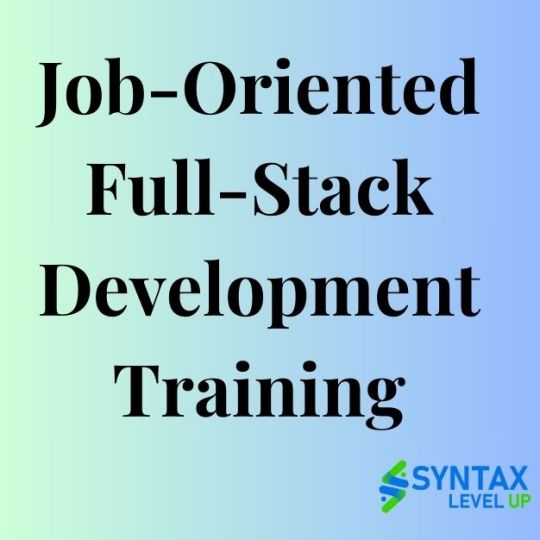
Why Choose Full Stack Development?
A full stack developer is a professional capable of working on both front-end and back-end development, making them highly versatile in the tech world. As businesses increasingly seek professionals with a broad skill set, full stack developers are in high demand. By mastering both client-side and server-side technologies, full stack developers play a pivotal role in web and software development.
What Does a Full Stack Developer Course in Pune Offer?
Enrolling in a full stack development course in Pune will equip you with the skills needed to build complete web and mobile applications. These courses generally cover:
Front-End Development: Learn to design responsive and dynamic user interfaces using HTML, CSS, and JavaScript.
Back-End Development: Master server-side programming with languages like Java, Python, or Node.js, along with databases like MySQL, MongoDB, and more.
Version Control: Get hands-on experience with tools like Git for collaboration and project management.
API Integration: Understand how to work with RESTful APIs to integrate various services within web applications.
Deployment: Learn to deploy and manage applications on platforms like AWS, Heroku, or Google Cloud.
What Sets SyntaxLevelUp Apart?
Among the many training providers in Pune, SyntaxLevelUp has built a reputation for offering top-notch full stack developer courses with a focus on job placement. Here are some reasons why SyntaxLevelUp should be on your radar:
Comprehensive CurriculumSyntaxLevelUp’s full stack web development course covers everything from basic coding to advanced frameworks. Whether you’re a beginner or someone with some coding experience, the course is designed to elevate your skills. Topics include full stack Java, MERN (MongoDB, Express.js, React.js, Node.js), and more.
Placement AssistanceSyntaxLevelUp provides 100% placement support, making it one of the best full stack courses in Pune for those aiming for job-ready skills. Their dedicated placement team ensures you get opportunities in top tech companies, both local and international.
Hands-on LearningThe course emphasizes practical learning through real-world projects. SyntaxLevelUp ensures that you not only learn concepts but also apply them by building end-to-end projects that showcase your skills to potential employers.
Industry Expert TrainersWith industry-experienced trainers, you’ll learn best practices that are up-to-date with the latest tech trends. They provide mentorship throughout the learning journey, ensuring you grasp both theoretical concepts and practical applications.
Flexible Learning OptionsWhether you prefer weekday, weekend, or fast-track batches, SyntaxLevelUp offers flexible learning schedules to suit your lifestyle. This flexibility ensures that professionals and students alike can benefit from the course without compromising other commitments.
The Path to Becoming a Full Stack Developer
Taking a full stack developer course in Pune opens up several career paths, including web developer, software engineer, mobile app developer, and even tech lead roles. With comprehensive courses that cover both front-end and back-end development, you’ll be well-prepared to land high-paying jobs in top tech companies.
Conclusion: Why Full Stack Development is a Great Career Choice in Pune
Pune’s growing IT sector presents an excellent opportunity for those looking to break into tech or level up their careers. By choosing a full stack developer course with SyntaxLevelUp, you’ll gain the technical knowledge, practical experience, and industry connections needed to thrive in the software development field.
With high placement rates, an extensive curriculum, and a hands-on approach to learning, SyntaxLevelUp is one of the best full stack developer classes in Pune. Whether you're looking to specialize in Java full stack development or learn the MERN stack, this course can set you on the path to success.
#fullstack training in pune#full stack developer course in pune#full stack developer course in pune with placement#full stack java developer course in pune#full stack developer classes in pune#full stack course in pune#best full stack developer course in pune#full stack classes in pune#full stack web development course in pune
0 notes
Text
Lightning Web Runtime (LWR) in Salesforce – A Modern Approach to Web Application Development
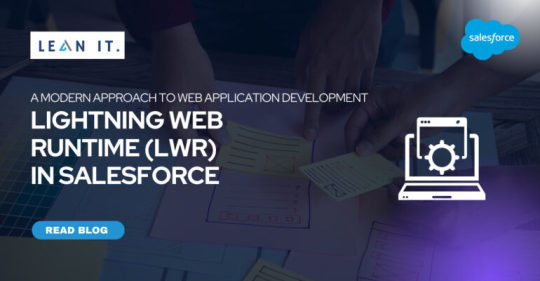
Discover the capabilities of Lightning Web Runtime (LWR) – a cutting-edge technology by Salesforce that empowers developers to create web applications using popular frameworks like React, Angular, and Vue. With LWR, you can build standalone web apps that operate independently from the Salesforce platform, while seamlessly accessing Salesforce data and services through APIs. This article explores the benefits, limitations, and potential of LWR in revolutionizing web application development.
Benefits of LWR in Salesforce:
Advanced Technology Stack: LWR leverages modern web technologies such as Node.js, Express.js, and Webpack. It provides a lightweight runtime environment, enabling swift development and deployment of web applications.
Developer-Friendly Tools: Take advantage of the Lightning Web Components framework, Salesforce CLI, and VS Code extensions that simplify the building, testing, and deployment process for LWR applications.
Enhanced Security Features: LWR includes robust security measures like user authentication and authorization, HTTPS encryption, CSRF protection, and cross-origin resource sharing (CORS) for seamless communication with external services.
Versatile Deployment Options: Deploy LWR applications on a variety of platforms, including Heroku, AWS, Google Cloud Platform, or on-premises using Docker containers.
Limitations of LWR in Salesforce:
Browser Support: Currently, LWR is only compatible with the latest versions of Google Chrome and Microsoft Edge, which may require additional development efforts to support other browsers.
Functionality Constraints: While LWR allows access to Salesforce data and services through APIs, it does not support all the features available in Salesforce. Notably, Visualforce pages and certain complex Salesforce platform functionalities are not supported.
Availability Restrictions: LWR is currently available as a pilot program exclusively for select customers and partners. Keep in mind that it is not yet generally available and may undergo changes before its official release.
Limited Customization Options: Customizing LWR applications within Salesforce using declarative tools is limited. Comprehensive customizations may require additional development work outside the LWR framework.
Developing Ecosystem: Although LWR employs popular web technologies like Node.js and React, the developer community is comparatively smaller when compared to frameworks like Angular or React.
Lightning Web Runtime (LWR) emerges as a powerful technology from Salesforce, allowing developers to build and deploy web applications using contemporary standards and frameworks. By harnessing LWR, developers can create standalone web applications independent of the Salesforce platform, while leveraging Salesforce data and services through APIs. Stay tuned for the official release of LWR, and explore the immense potential it holds for transforming web application development.
Author: Yashbhal Singh
Read More At: https://leanitcorp.com/lightning-web-runtime-lwr-in-salesforce-a-modern-approach-to-web-application-development/
Tags: Salesforce implementation partners, salesforce nonprofit consultants, top Salesforce consulting firms, best salesforce consulting firms
#Salesforce implementation partners#salesforce nonprofit consultants#top Salesforce consulting firms#best salesforce consulting firms
0 notes
Text
Become a Full Stack Web Developer with Our Immersive Coding Bootcamp

Our intensive Full Stack Developer Course Training provides you with the specialized expertise to construct complete web apps and interfaces leveraging both front and back-end technologies.
Through building real-world projects, you will gain in-demand skills across:
Frontend Web Development
HTML/CSS: Structure and style responsive web page layouts JavaScript: Add interactive elements and dynamically rendered components React: Build complex component-driven user interfaces Responsive design: Optimize sites for mobile, tablet, and desktop
Backend Web Development
Node.js: JavaScript runtime environment for server-side logic Express: Flexible Node.js web application framework MySQL: Manage persistent data in relational databases MongoDB: Store unstructured document-based data REST APIs: Interface backend services with frontend applications Full Stack Integration
Utilize Git version control
Implement authentication, security protocols Containerize apps with Docker Test code and fix bugs throughout development Deploy apps on virtual servers like AWS, Heroku The curriculum covers modern frameworks and tools for constructing high performance, scalable web apps demanded by industry today.
Upon completing the bootcamp, you’ll have a professional project portfolio combined with the specialized expertise to thrive as a Full Stack Web Developer.
Kickstart your Software Engineering Career by enrolling today!
0 notes
Text
Unveiling the Power of MERN Stack: A Comprehensive Guide
In the ever-evolving landscape of web development, choosing the right technology stack is crucial for building robust and scalable applications. One such powerful and popular stack is the MERN stack, comprising MongoDB, Express.js, React.js, and Node.js. In this blog post, we will dive into the intricacies of each component and explore how they seamlessly work together to create dynamic and feature-rich web applications.
MongoDB:
MongoDB, a NoSQL database, forms the 'M' in MERN stack. Its flexible schema allows developers to store data in a JSON-like format, making it easy to handle and manage large amounts of structured and unstructured data. MongoDB's scalability and high performance make it an ideal choice for applications with rapidly changing data requirements.
Express.js:
Express.js, often referred to as the 'E' in MERN stack, is a minimalistic and flexible Node.js web application framework. It simplifies the process of building robust and scalable web applications by providing a set of features for web and mobile applications. Express.js facilitates the creation of server-side logic, routing, and middleware, streamlining the development process and enhancing the overall performance of the application.
React.js:
React.js, the 'R' in MERN stack, is a JavaScript library for building user interfaces. Developed and maintained by Facebook, React.js enables the creation of interactive and dynamic user interfaces with ease. Its component-based architecture allows developers to build reusable UI components, making the codebase modular and maintainable. React.js also provides a virtual DOM, which enhances the application's performance by minimizing unnecessary updates and rendering only the components that have changed.
Node.js:
Node.js forms the 'N' in MERN stack and serves as the runtime environment for executing server-side JavaScript code. With its non-blocking, event-driven architecture, Node.js enables the development of highly scalable and performant applications. Node.js seamlessly integrates with Express.js, allowing developers to build a complete web application using JavaScript for both the client and server sides.
Building a MERN Stack Application:
To showcase the power of MERN stack, let's walk through the process of building a simple task management application:
a. Setting up the environment:
Install Node.js and npm
Set up a MongoDB database
Create a new React.js application using create-react-app
Initialize an Express.js server
b. Connecting MongoDB with Express.js:
Use Mongoose, an ODM (Object Data Modeling) library, to interact with MongoDB
Define models and schemas for the application's data
c. Building the frontend with React.js:
Create components for tasks, user interface, and interactions
Use React Router for navigation between different views
Fetch and display data from the Express.js API
d. Implementing server-side logic with Express.js:
Set up routes for handling CRUD (Create, Read, Update, Delete) operations
Implement middleware for authentication and error handling
e. Deploying the MERN stack application:
Choose a hosting provider (e.g., Heroku, AWS, or DigitalOcean)
Configure the deployment environment
Deploy both the frontend and backend components
Conclusion:
The MERN stack provides a powerful and efficient framework for developing modern web applications. MongoDB, Express.js, React.js, and Node.js complement each other seamlessly, enabling developers to build scalable, performant, and feature-rich applications. As you embark on your journey with MERN stack development, explore the vast ecosystem of libraries and tools available to enhance your productivity and create cutting-edge web solutions. Happy coding!
1 note
·
View note
Text
Fullstack Developer Course
Fullstack Developer Course in Hyderabad
A Full Stack Developer Course is a comprehensive program designed to equip individuals with the skills and knowledge needed to become proficient in both front-end and back-end web development. This course typically covers a wide range of technologies and tools, enabling students to build complete web applications from start to finish.
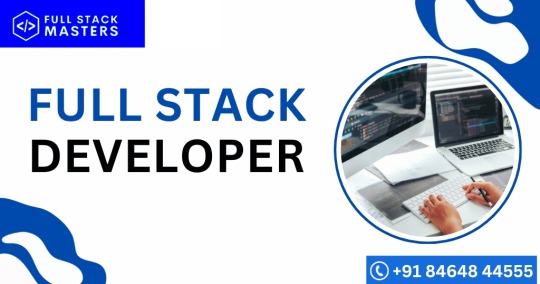
Key components of a Full Stack Developer Course often include:
Front-end Development: Learning HTML, CSS, and JavaScript for creating responsive and user-friendly interfaces.
Back-end Development: Teaching server-side programming using languages like Python, Ruby, Java, or Node.js, and exploring databases such as MySQL or MongoDB.
Version Control: Familiarizing students with tools like Git and GitHub for collaborative coding and code management.
Web Frameworks: Introducing popular frameworks like React, Angular, or Vue.js for front-end development, and Express, Django, or Ruby on Rails for back-end development.
API Development: Covering the creation and consumption of APIs to enable communication between the front-end and back-end of web applications.
Deployment and Hosting: Exploring the process of deploying web applications on cloud platforms like AWS, Heroku, or Netlify.
DevOps: Teaching basic DevOps concepts for continuous integration and deployment (CI/CD) to streamline the development process.
A Full Stack Developer Course provides a well-rounded education, enabling graduates to work on various aspects of web development and become proficient in client-side and server-side programming. This skill set is highly sought after in the tech industry, making it a valuable and versatile career choice.

Best uses and applications of a Full Stack Developer course:
Web Development: Fullstack developers are skilled in both front-end and back-end development, allowing them to create complete, feature-rich web applications. This includes building websites, web apps, and e-commerce platforms.
Start Your Own Projects: With a solid understanding of both front-end and back-end technologies, you can bring your own ideas to life. This is especially valuable if you have entrepreneurial ambitions and want to create your own web-based business.
Freelancing: Full Stack Developers often have the flexibility to work as freelancers. You can take on diverse projects for clients, ranging from website design to database development, and enjoy the freedom of setting your own schedule.
Career Advancement: Many companies value Full Stack Developers for their versatility. As you gain experience, you can advance into roles like Lead Developer, Technical Architect, or DevOps Engineer. These positions often come with higher salaries and more responsibility.
Specialize as Needed: While Full Stack Developers have a broad skill set, they can also choose to specialize in either front-end or back-end development if they have a preference. This flexibility allows you to tailor your career to your interests and market demand.
Work for Tech Companies: Tech giants, startups, and established companies are always in need of Full Stack Developers to maintain and enhance their web applications. These jobs often come with competitive salaries and benefits.
Remote Work: Full Stack Development skills can be applied from anywhere with an internet connection, making it an ideal career choice for those who prefer remote work or digital nomadism.
Cross-Training: If you're already a developer (front-end or back-end), learning the other side can make you a more well-rounded and valuable team member. You can understand the entire web development process and collaborate more effectively with your colleagues.
Contributing to Open Source Projects: Full Stack Developers can contribute to open-source projects, improving their coding skills and giving back to the developer community.
Continuous Learning: The tech industry is constantly evolving, and Full Stack Developers need to keep learning to stay updated with the latest technologies. This career path encourages continuous education and personal growth.
In summary, a Full Stack Developer course equips you with a versatile skill set that can lead to a variety of exciting career opportunities in web development and beyond. Your ability to create, maintain, and improve web applications will make you a valuable asset in the tech industry.https://fullstackmasters.in/
1 note
·
View note
Text
How Node JS Bring Success to Your Online Business?
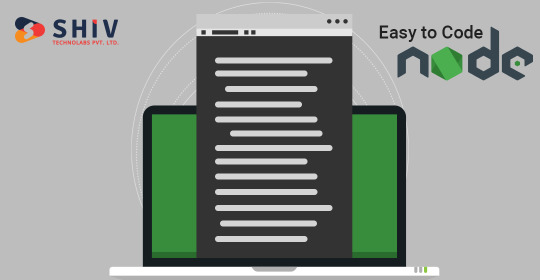
Node.js is one of the best JavaScript platform which is built on Chrome’s V8 JavaScript engine. Node.js development is one of the powerful, efficient, fast, & scalable web server. It is developed to use non-blocking, event-driven I/O to remain lightweight & efficient in the face of data-intensive real time apps that runs across multiple devices.
Today, many top app development companies use it for various security benefits such as high performance, cloud-enabled technology, cheap hosting services, MVP delivery, easy execution & installation, lightweight Node Js Development Services.
Top Benefits of NodeJS for Your Online Business
1. It’s Easy to Code
Node.js code is easy to learn and write and web developers can easily write code in JavaScript for both the server & client. JavaScript makes it convenient for transferring data between the client & the server that works simultaneously.
2. No Learning Curves Involved
As we have discussed above that it’s easy to learn node.js and you don’t have to go through the complex syntax learning & grasping procedures since the node is based on JavaScript.
Node.js developers will find it flexible to learn, code, develop, & deploy scalable node apps on multiple platforms such as Windows & UNIX. Even it’s easy to learn for beginners as well and can easily develop some robust applications.
3. Best for Developing Real-Time Web Apps
Node.js helps you to build real-time web applications at a light speed for making simple blog sites in Chat apps, gaming apps. The event-driven architecture serves both client and server-side codes written in JavaScript.
4. Allow Data Streaming
Web developers know that HTTP request & response are two separate events where developers can take benefits of data streams such as processing files at the time of loading & creation of the attributes, it also reduces the duration of the data transmission process.
5. NPM Enterprise
NPM enables programmers to install, update, & utilize smaller modules of open-source software packages. It makes the process much easier without any complexity for developers to build apps from scratch.
Developers can avoid writing complex coding layers by simply twisting the code lines as per their requirements. The major benefit is that a plethora of Node.js libraries & apps are published on npm, and several are added every day.
6. Hosting
The demand for web hosting is increased and Node.js is one of the most popular and in-demand platforms from the past few years. PaaS service providers like Heroku and Modulus are allowing the deployment of node.js without any problem for your web hosting needs.
7. Cross-Platform Ensures Flexibility
As Node.js is a cross-platform JavaScript platform, it offers the maximum flexibility in terms of hosting it on any server. Since Node application can be implemented on multiple platforms and that gives multiple options to the developers.
8. Useful for Clients
Node.js has the support of a huge open source community that delivers outstanding modules that work everywhere such as Socket.io. It maintains the constant communication between the client & the server and allows them to send real-time updates to each other.
9. Proxy Server
Node provides the best solution for the proxy server and it also works as a Proxy to the firms that do not have the proper infrastructure for proxy needs.
10. Benefits of Caching
As Node.js provides the open-source platform, developers can enjoy the benefit of caching single modules as well. When you request for the first modules, it will get cached automatically on the app's memory.
It enables developers to load web pages faster as they don’t have to re-execute the codes. Also, users can navigate through these applications swiftly because of Node.js high responding speed.
Wrapping-up:
From the above discussion, it’s clear that Node.js is much popular among startups and provides you many more benefits that is the reason why big giants like PayPal, Netflix, Microdot, and eBay are using Node as a feature-rich app development framework today. Shiv Technolabs Pvt. Ltd. is the best NodeJS Development Company & our dedicated Node.js developers are technology-conscious and can be a helping hand for your several projects of web Development.
1 note
·
View note
Text
The Key Qualities of a Full Stack Web Developer
Becoming a Full Stack Web Developer means mastering both the art of building beautiful front-end experiences Full Stack Developer Course Online and managing the complex back-end that powers applications. If you’re thinking of diving into this versatile role, here are some key skills you need to hone to succeed in today’s fast-paced tech environment.

1. Mastering Front-End and Back-End Development
A Full Stack Developer needs to be comfortable with both sides of web development:
Front-End: This involves working with HTML, CSS, and JavaScript to create interactive, responsive, and user-friendly interfaces. Knowing modern frameworks like React, Angular, or Vue.js will give you the tools to build smooth, dynamic web applications.
Back-End: Server-side programming with languages such as Node.js, Python, Ruby, Java, or PHP is crucial. Learning back-end frameworks like Express.js, Django, or Ruby on Rails helps in structuring apps and managing the server-side logic behind the scenes.
By mastering both front-end and back-end development, Full Stack Developers ensure that everything from user interface to data handling is seamless.
2. Strong Database Management Skills
Being able to manage data efficiently is another vital part of full stack development:
SQL Databases: Tools like MySQL and PostgreSQL store data in structured formats and are widely used for managing relational data.
NoSQL Databases: With databases like MongoDB, Full Stack Developers can handle more flexible, unstructured data for applications that require scalability and fast data retrieval.
This expertise ensures that developers can organize, store, and retrieve data smoothly, making sure that their applications perform well under pressure.
3. API Creation and Integration
Understanding how to build and integrate APIs (Application Programming Interfaces) is critical:
RESTful APIs: These are used to connect the front-end with the back-end, allowing users to interact with your web app.
Graph QL: This alternative to REST Best Online Training Programs allows for more efficient data querying, providing more control over the exact data needed for specific tasks.
Full Stack Developers who are comfortable with APIs make their apps more dynamic and capable of handling complex data interactions.
4. Knowledge of Version Control and Team Collaboration
When working on projects, especially in a team, version control is a must:
Git: Full Stack Developers should know how to track code changes using Git, ensuring smooth collaboration when multiple developers are involved.
Platforms like GitHub and GitLab: These tools help teams manage their projects, review code, and handle feature branches.
With version control, Full Stack Developers can work together more effectively and ensure high-quality, bug-free code.
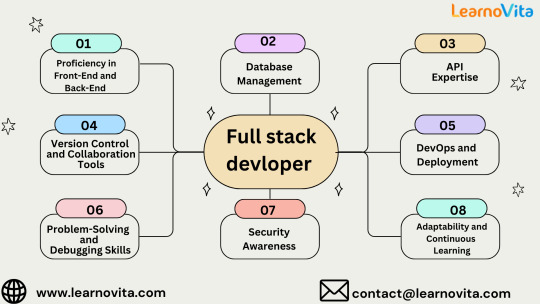
5. DevOps and Deployment Expertise
A Full Stack Developer’s job isn’t over once the code is written. Knowing how to deploy applications is just as important:
Cloud Hosting: AWS, Google Cloud, or Heroku are popular platforms for hosting web apps. Developers should understand how to deploy, manage, and scale their apps in these environments.
Containerization: Using tools like Docker to create consistent environments for your app across development, testing, and production makes the deployment process much smoother.
By having DevOps skills, Full Stack Developers can ensure that their apps are scalable, reliable, and ready to handle real-world traffic.
6. Problem-Solving and Debugging Abilities
Troubleshooting is a big part of any developer's life. Full Stack Developers need to be comfortable with:
Debugging Tools: Using browser developer tools or server-side loggers helps in quickly identifying bugs and performance issues.
Optimization: Beyond fixing bugs, developers should optimize their code to ensure applications load quickly and run efficiently.
With solid problem-solving skills, Full Stack Developers can resolve issues across the entire stack, ensuring a smooth user experience.
7. Security Best Practices
Security is a huge concern for web applications. A good Full Stack Developer needs to know how to protect their app from potential threats:
Preventing Vulnerabilities: Understanding threats like SQL injection, cross-site scripting (XSS), and cross-site request forgery (CSRF) is key. Developers should implement data validation, secure authentication, and encryption practices.
Encryption: Sensitive user data, like passwords or personal information, should always be encrypted both in transit and at rest.
By following security best practices, Full Stack Developers ensure that their apps are safe, secure, and trustworthy for users.
8. Adaptability and Continuous Learning
The tech landscape is constantly evolving, and Full Stack Developers must stay ahead by continuously learning:
New Tools and Frameworks: Keeping up with the latest programming languages, tools, and frameworks is essential to stay relevant in this fast-moving industry.
Methodologies: Many development teams use Agile or Scrum methodologies. Developers should be comfortable working in these environments to manage projects effectively.
Continuous learning is what keeps Full Stack Developers on top of their game, enabling them to build cutting-edge applications and keep their skills sharp.
Final Thoughts
Being a Full Stack Developer means being a jack-of-all-trades in web development, with the ability to work across both the front-end and back-end of an application. The role demands a diverse skill set, adaptability, and a strong commitment to learning. Master these skills, and you’ll be well on your way to building robust, secure, and scalable web applications in today’s tech-driven world.
0 notes